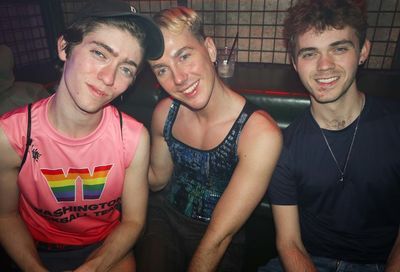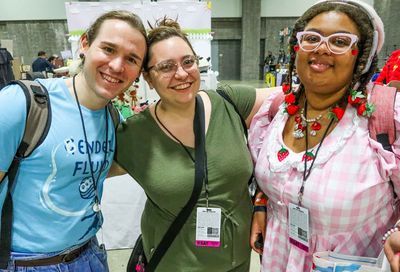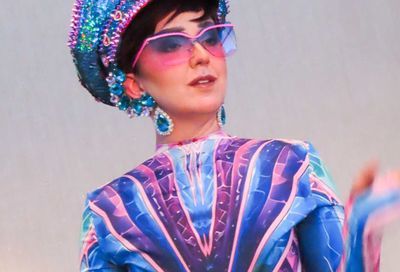His Brother's Keeper
Carrying the legacy begun by his younger brother, straight ally Patrick Burke's mission is to make all sports a place where You Can Play

Burke
MW: What was like the biggest question in your mind when he came out to you?
BURKE: I used to joke that he should write a gay encyclopedia so I could just sit down and learn it all at once, because Brendan was the first gay person I knew. It was the first time the gay community had ever been in my life in any way. And he was my best friend and brother so I’d better get caught up, quick.
That Christmas I had just come back from a scouting trip and we were at my mom’s house and I had a bunch of bags in the car. I said, ”B, can you help me carry all these bags in?” So we walked outside, and he said, ”I have something really important to tell you. I’m gay.” And I said, ”Are you being serious or are you joking?” He said he was serious. And I said, ”Swear on the Stanley Cup” — growing up in a hockey family, it wasn’t swear on the Bible, it was swear on the Stanley Cup — so he said, ”I swear on the Stanley Cup, I’m gay.” I told him, ”I still love you and I’m proud of you,” and gave him a big hug. Then, when we walked back inside the house, I yelled, ”Mom, you owe me 20 bucks! I always told you he was gay.” It was really important for me that he knew that I was still going to give him crap, I was still his big brother, that he was still going to get made fun of.
But then a couple of weeks later I sat him down to apologize for all the times that I had used gay slurs. And when we talk to athletes this is the part that I really try to emphasize. As a straight guy, the hardest thing I’ve ever had to do was sit down with my best friend and apologize, and say, ”I’m sorry if you as my little brother ever felt like I wouldn’t love you or I wouldn’t support you. I’m sorry if I ever made your life harder.” That’s an awful, awful thing to have to do, to look back and wonder, did I ever keep him up at night worrying? Did I ever make him feel like his big brother wouldn’t be there for him? That’s an awful thing that no one should have to go through, on either side.
He shouldn’t have had to go through that, I should have been more aware. I wish someone had been able to reach me and say, ”Look, someone you care about is going to come out to you someday, and your life is going to be a lot easier if you’ve been supportive beforehand.” I don’t think we’re asking for much at You Can Play. All we’re asking for is to eliminate about 10 words from their vocabulary. That’s 90 percent of the battle in most locker rooms. Get rid of the language that’s keeping kids in the closet.
How hard is that? There are wonderful swear words you can use in place. You can still call a guy an asshole. We’re not trying to make the locker room this happy, ”Kumbaya” place. The locker room should always be a place where I would feel ashamed to bring my mother. That’s what locker rooms are.
MW: Brendan was your brother and your best friend, and you’ve founded an organization that’s inspired by him. Does that make the loss harder sometimes, because you’re doing so much to keep him present in your life?
BURKE: Everyone in my family has hard days and hard weeks. I’m always thinking of him, and I know my sisters and my parents are too. In the aftermath of the accident I was very hurt and angry and upset and confused. I didn’t know what to do. You Can Play has given me an outlet for a lot of that.
So, I do have hard days, I do get frustrated. I go into meetings and I leave and I think, ”God, if Brendan was here selling this, everyone in that room would be on board, it wouldn’t even be an issue.” I always think about how much better at this Brendan would be than I am. But on the other hand, it’s something that I’m intensely proud of. It’s been incredibly personal for me because it is for him. That gives me the energy on the nights that I feel tired, the nights when I feel like it’s too much work. Thinking of Brendan gives me the drive to get me through that. Brendan keeps me going.
MW: You’re a talent scout for the Philadelphia Flyers, so I’m sure you know the culture of amateur youth and college sports. Is the casual use of homophobic language the worst thing you’ve seen?
BURKE: That’s the worst thing I’ve seen. We hear horror stories, but most of them — not all, but most — are from five to 10 years ago. In the last few years, there’s been a massive shift from a culture of actively bullying gay athletes and physically harming athletes, and the vast majority of athletes who come out at the college or the high school level have a positive experience. So, most of the negative stuff that we hear is based on throwing around those kinds of slurs. We do get the stories about someone who was kicked off his team, a lesbian athlete who was physically intimidated, and they’re awful stories. But in the big picture, sports is really just better. I don’t want to say it’s solved, but sports is very close to it being a non-issue.
MW: Why do you think that the past five to 10 years has been such a culture shift?
BURKE: I think the younger generation is just raised with it a little bit more. The broader culture has changed, not just sports. Even simple things, like seeing a gay character on TV. And you look at the numbers on the younger generations and their beliefs on LGBT acceptance and inclusion, and it’s overwhelming.
It sounds dumb, but one of the biggest things has been athletes’ wives and girlfriends. So many athletes that we talk to at the professional level are like, ”I never really knew any gay people and then we moved to Boston and all of a sudden my wife has five gay friends, and they’re all good guys.” Matt Hendricks, from the Washington Capitals, said that he was happy to do [a You Can Play video] and he was proud of it, but originally it was his wife’s idea. We’re getting a lot from the wives who grew up with gay friends or who have gay friends, telling their husbands, ”Hey, get your shit together on this.”
MW: I interviewed former NFL player Wade Davis recently and he told me he thought that the first out, male professional athlete was going to be somebody who had already come out in high school or college, because the circus around a pro athlete coming out is just going to be too much. Is that something you would agree with or not?
BURKE: I think we’re going to have one sooner than that, personally. I understand Wade’s belief, and it’s something that we’ve talked about a lot, that we’re going to start getting these athletes to come out in high school and college, and then get drafted.
I think we’re going to have a gay athlete in professional sports sooner than that. I’ve said that I believe we’ll have an openly gay NHL player within the next two years. I don’t know of – and I think I would be aware of them – openly gay collegiate athletes in any of the four major sports who are considered professional prospects at this point. My feeling is that we’re going to have one before that, but we very much look forward to the day when guys start coming up that way and it’s a non-issue.
MW: Do you hope that it’s hockey that has the first?
BURKE: I don’t care who it is, I just want it to happen. [Laughs.]
MW: My impression is that there are still a lot of LGBT people who are remain standoffish about sports, whether from past experience or whatever. What do you those people are missing?
BURKE: It’s inclusion. And not just that we want LGBT people to be included. Myself, growing up I was part of a team. I was part of something that was striving for a common goal, that was working together, that was getting better every day in pursuit of something. And it teaches you responsibility, it teaches you leadership, it gives you self-confidence. I wouldn’t be able to do what I’m doing today in a leadership capacity without my hockey experience.
There is a large part of the LGBT community who doesn’t get sports and they think that we’re wasting our time and that this isn’t important. It’s funny, actually, I talked to the guy from GLAAD who does similar things and he said the most complaints they get are when they do something sports related. Many, many gay people email them and say, ”Why are you wasting your time on sports?”
Actually, this is something that’s interesting to talk about. We anticipated that we would have to do a lot of media training for athletes and a lot of training for the straight media — like what LGBT stands for, the basic stuff. We’ve had athletes go out unprepared for it, someone just puts a microphone in their face and asks, ”What do you think about the You Can Play project?” And the first couple times we were just like, ”Oh no, just don’t say anything dumb.” We were waiting for a guy to go, ”Hey, I love homos.” [Laughs.] But every one of them has been spot on. These guys get it.
We’ve had a way bigger issue with training the LGBT media to speak to athletes. We’ve had the LGBT media going, ”What am I supposed to ask him about?” We’re like, well, you should talk to him about this and this. ”Okay, well, is he any good?” He’s a five-time all-star in the National Hockey League, so yes, he’s pretty good. ”What position does he play? What does that mean?” And I’m like, you know what Wikipedia is? This guy’s got a page, go for it.
MW: That’s kind of depressing from my perspective.
BURKE: It comes back to the fact that there’s a large segment of the LGBT population that doesn’t particularly enjoy sports. Or, more accurately I should say, doesn’t particularly enjoy the four major male team sports. There’s lots of tennis players and golfers and runners and whatever. And it’s partially our fault in the sports world by the way, because we haven’t exactly been inclusive and we haven’t exactly welcomed the community into our arenas. But there’s a large segment that isn’t big on sports.
We say things like there are large portions of the community that aren’t big sports fans, but there’s also a large portion that is but who hasn’t felt welcome. If you go to, let’s say a Bruins game because I’m here in Boston, and you’re gonna sit in the stands and hear the word ”fag” thrown around all night, that’s not fun. The sports teams have to do a better job of making our arenas safe and LGBT friendly, so that we can encourage the gay sports fans. It’s almost like they’re closeted about being sports fans in some cases.
MW: I know that when someone talks about trying to make large spaces LGBT friendly, there can be blowback from conservative media or political pushback. Have you encountered anything like that?
BURKE: We have not had any pushback. I think that’s because our message is very limited. We do not do, for example, marriage equality. We don’t do health care issues. We don’t do any of the thousands of various political issues that come up in the LGBT world. All we do is sports. All we ask is that the players say, ”I will treat an openly gay teammate or fan with respect.” I don’t think it’s easy to attack our position, because all we’re saying is you have to treat people with respect. You don’t have to like them, you don’t have to be best friends with your gay teammate, you don’t have to go to Nellie’s with them, but you have to treat them with respect. And if anybody would like to come out in favor of treating people with disrespect, in favor of being offensive and intimidating and rude to people, in favor of bullying people, then I would welcome that debate, because I think it’s pretty clear who’s on the right side here.
The Team DC 2012 Champions Awards, Saturday, Oct. 13, honor several members of the LGBT sports community, including scholarship recipients. Tickets are $50 at the door and include dinner and dessert by The Heights, vodka and beer courtesy of Nellie’s Sports Bar. The event runs 6 to 8 p.m. at the Human Rights Campaign Equality Center, 1640 Rhode Island Ave. NW. For more information, visit teamdc.org.
Support Metro Weekly’s Journalism
These are challenging times for news organizations. And yet it’s crucial we stay active and provide vital resources and information to both our local readers and the world. So won’t you please take a moment and consider supporting Metro Weekly with a membership? For as little as $5 a month, you can help ensure Metro Weekly magazine and MetroWeekly.com remain free, viable resources as we provide the best, most diverse, culturally-resonant LGBTQ coverage in both the D.C. region and around the world. Memberships come with exclusive perks and discounts, your own personal digital delivery of each week’s magazine (and an archive), access to our Member's Lounge when it launches this fall, and exclusive members-only items like Metro Weekly Membership Mugs and Tote Bags! Check out all our membership levels here and please join us today!




















